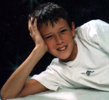Stand Up To Pediatric Cancer
Steven is in this video that I found randomly on another site
September is National Childhood Cancer Awareness Month.
During this month, I will be writing on different topics related to my views about cancer and our children and the effects on families.
I'm going to start with Stand Up To Cancer, (SU2C) an initiative of the Entertainment Industry Foundation.
There will be a one-hour TV show / telethon this Friday evening at 8:00 PM that will air simultaneously on all three major TV networks: CBS, NBC, and ABC.
The goal is to raise private monies to be used to accelerate progress against cancer and directly impact patient care.
It's a worthy goal, the budget for cancer research has been cut every single year since 2003, as the rate of cancer increases. Better solutions are needed somehow.
The parents of several children we know with brain tumors sent in their stories and there is a possibility they will be mentioned on the show.
I took a good look at their site and while I like their general approach, I was very disappointed by a complete lack of representation for pediatric cancers, the emphasis for SU2C is adults.
I saw items on pancreatic and prostate and breast and colorectal cancer, all worthy causes, but they are not pediatric cancers.
In terms of numbers, the number one childhood cancer is leukemia. Number two is brain cancer.
SU2C's explanation of where the money goes
Below is SU2C's advisory committee.
- Phillip A. Sharp, Ph.D., MIT
Research interests: Gene silencing through RNA interference - Arnold J. Levine, Ph.D., Institute for Advanced Study, Princeton
Research interests: - Brian J. Druker, M.D., OHSU
Research interests: Chronic myelogeous leukemia and gleevec - Julian Adams, Ph.D., CSO, Infinity Pharmaceuticals
Research interests: Multiple myeloma and Alzheimers - Elizabeth H. Blackburn, Ph.D, UCSF
Research interests: Understanding telomeres and telomerase - Raymond N. DuBois, M.D., Ph.D., MD Anderson, Executive VP
Research interests: Intestinal cancer - Richard B. Gaynor, M.D., VP Cancer Research, Eli Lilly
Research interests: Breast and colon cancer - Waun Ki Hong, M.D., MD Anderson
Research interests: Head and neck cancer, chemoprevention, retinoids - William G. Kaelin, Jr., M.D., Dana Farber Cancer Institute
Research interests: Functions of tumor suppressor proteins in retinoblastoma and von Hippel-Laundau syndrome - Richard D. Kolodner, Ph.D., UCSD
Research interests: Colon cancer, genetic recombination and repair - Ronald Levy, M.D., Stanford University
Research interests: Lymphocytes and Lymphoma - Tak W. Mak, Ph.D., Princess Margaret Hospital, Toronto
Research interests: Breast cancer - William G. Nelson V, M.D., Ph.D., Johns Hopkins
Research interests: Prostate cancer - Cecil B. Pickett, Ph.D., President of R&D, Biogen Idec
Research interests: The regulation of gene expression by oxidative stress. - Vicki L. Sato, Ph.D., Harvard Business School
Research interests: innovation and productivity as they relate to improved outcomes in biotechnology and pharmaceutical R&D. - Laura K. Shawver, Ph.D., CEO Phenomix Corp.
Research interests: Tyrosine kinase inhibiting drugs and antiangiogenesis - Ellen Sigal, Ph.D., Friends of Cancer Research, VA
Research interests: Cancer advocacy, Russian history - Joseph V. Simone, M.D., Pediatric Hem-Onc, Shands Cancer Center, FL
Research interests: Childhood leukemia and lymphoma - Samuel A. Wells, Jr., M.D., Professor of surgery, Washington University, MO
Research interests: Multiple Endocrine Neoplasia - James E. Williams, Jr., Intercultural Cancer Council, PA
Research interests: Policies, programs, partnerships, and research to eliminate the unequal burden of cancer among racial and ethnic minorities and medically underserved populations in the US.
Out of their All-Star Gang of 20, there is only one doctor with a pediatric specialty, Dr. Joseph Simone, M.D., who works in the department of pediatric Hematology-Oncology at Shands Cancer Center in Florida.
There is not a single neuro-oncologist or neurologist on board at all.
The treatment of brain cancer presents special challenges for a two main reasons-- one, it's the brain, and you can't just go in and remove the diseased bits without affecting some vital function, like maybe speech or vision or breathing. The second reason is that the brain protects itself from nasty chemicals and other things via a membrane called the blood-brain barrier (BBB).
Usually this is a good thing, but one consequence of the BBB is that it prevents chemotherapy drugs from reaching their target. One result of this is that when chemotherapy is given, it requires much higher doses to target tumors in the brain than elsewhere in the body.
What's really needed here are some completely novel approaches and out-of-the-box thinking.
Pharmaceutical companies are in business to make money, and they've hit it really big with drugs that lots of people use, like Viagra and high blood pressure medications and proton pump inhibitors like Nexium "the little purple pill" and asthma medications.
But if they were to come up with a really good drug that worked for brain cancer and nothing else, there's just not a lot of folks who are in the market, and so many of those that are there just keep dying. And the insurance companies don't want to pay for those great new medications like Avastin because they are expensive.
For the most part, brain cancers are equal opportunity killers, they don't ask for ID before they set up residence in a child's or a baby's brain.
But there are hosts of childhood brain tumors that don't occur in adults except very rarely. Brain cancers love young brains.
Kids don't pay taxes and they don't vote, and half the time their harried parents are too busy with the business of saving their child's life, their marriage and their own sanity to have time to read the papers or go the polls or write letters to their congressperson.
With very few exceptions, pharmaceutical companies test their drugs on adults before they test children, so it can be 2 years before a drug being used in adults is available for children.
From the SU2C's Where The Money Goes page, it says they will form "Dream Teams" to support the "required focused, intense, goal-directed, team-oriented attack on the cancer problem".
The focus of the Dream Teams is short-term patient benefit.
A worthy goal, but it seems nothing in pediatric brain tumor research is short term.
We'll be watching. I wish I wasn't so cynical and I hope I've got them wrong, but I am so disappointed to see kids unrepresented in such a major undertaking.
I hope they don't put our kids faces on the screen to sell cures for adults.
As for good organizations that target kids with brain tumors and other life-threatening illnesses, I suggest these:
- St. Jude Children's Research Hospital (in honor of Steven)
- Pediatric Brain Tumor Foundation
- Pediatric Brain Tumor Consortium Foundation
- Eat at Chili's restaurant on September 29
SU2C, I applaud your efforts and your ability to command three major networks, but please don't forget our kids. Our kids need help, and this is their month. Prove me wrong.
- Kathleen
Labels: cancer sucks




































2 Comments:
I totally agree with your post.....here is my thoughts long ago.....
http://curechildhoodcancer.blogspot.com/2008/06/sept-5th-expectations.html
look into my group of angry parents....
http://curechildhoodcancer.ning.com/
As a resource partner for the Stand up 2 Cancer campaign, Children’s Cancer Research Fund also applauds the commitment by the entertainment industry to raise funds for cancer research. However, we agree that it is critically necessary to focus research efforts on childhood cancers since they are so different from adult cancers. We have learned many causes and preventions of adult cancers, but we don’t yet know why cancer happens in children. Children’s Cancer Research Fund is dedicated to eradicating childhood cancer – and we are making great progress. In honor of Childhood Cancer Awareness month, we have launched Complete the Cure, a campaign to increase awareness and support of childhood cancer research through short video clips and generous corporate partners. Visit CompleteTheCure.com to learn more and forward to your family and friends who are committed to ensuring childhood cancer research gets the funding it deserves.
Post a Comment
<< Home